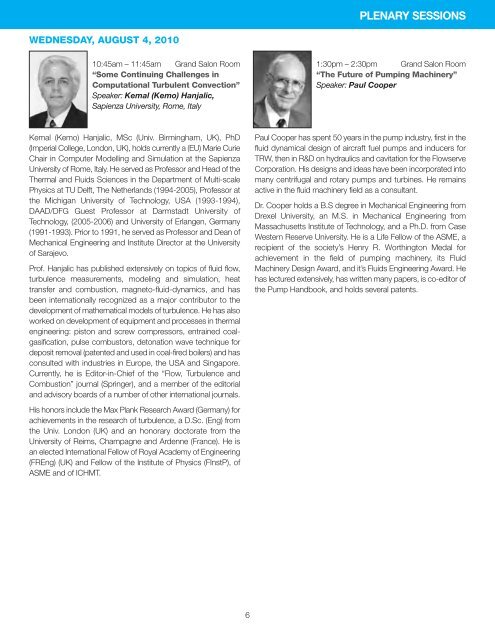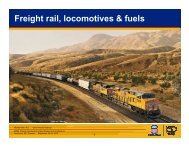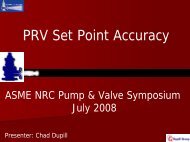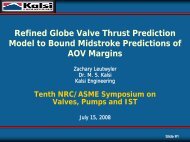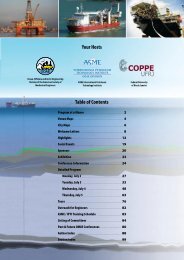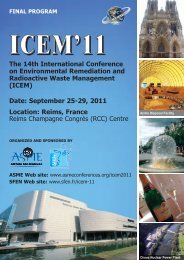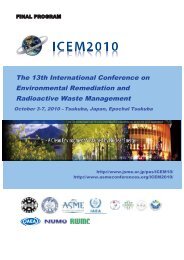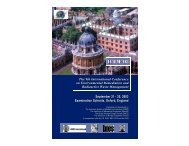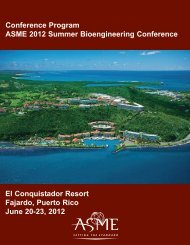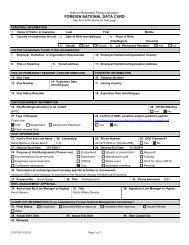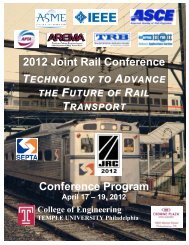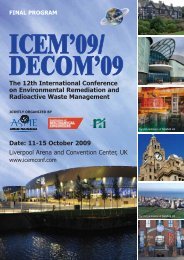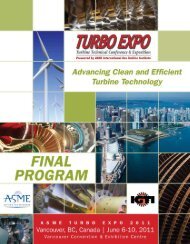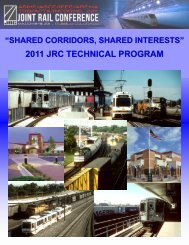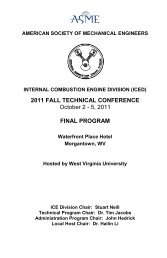ASME 2010 3rd Joint US–European Fluids Engineering ... - Events
ASME 2010 3rd Joint US–European Fluids Engineering ... - Events
ASME 2010 3rd Joint US–European Fluids Engineering ... - Events
You also want an ePaper? Increase the reach of your titles
YUMPU automatically turns print PDFs into web optimized ePapers that Google loves.
WEDNESDAY, AUGUST 4, <strong>2010</strong><br />
10:45am – 11:45am Grand Salon Room<br />
“Some Continuing Challenges in<br />
Computational Turbulent Convection”<br />
Speaker: Kemal (Kemo) Hanjalic,<br />
Sapienza University, Rome, Italy<br />
Kemal (Kemo) Hanjalic, MSc (Univ. Birmingham, UK), PhD<br />
(Imperial College, London, UK), holds currently a (EU) Marie Curie<br />
Chair in Computer Modelling and Simulation at the Sapienza<br />
University of Rome, Italy. He served as Professor and Head of the<br />
Thermal and <strong>Fluids</strong> Sciences in the Department of Multi-scale<br />
Physics at TU Delft, The Netherlands (1994-2005), Professor at<br />
the Michigan University of Technology, USA (1993-1994),<br />
DAAD/DFG Guest Professor at Darmstadt University of<br />
Technology, (2005-2006) and University of Erlangen, Germany<br />
(1991-1993). Prior to 1991, he served as Professor and Dean of<br />
Mechanical <strong>Engineering</strong> and Institute Director at the University<br />
of Sarajevo.<br />
Prof. Hanjalic has published extensively on topics of fluid flow,<br />
turbulence measurements, modeling and simulation, heat<br />
transfer and combustion, magneto-fluid-dynamics, and has<br />
been internationally recognized as a major contributor to the<br />
development of mathematical models of turbulence. He has also<br />
worked on development of equipment and processes in thermal<br />
engineering: piston and screw compressors, entrained coalgasification,<br />
pulse combustors, detonation wave technique for<br />
deposit removal (patented and used in coal-fired boilers) and has<br />
consulted with industries in Europe, the USA and Singapore.<br />
Currently, he is Editor-in-Chief of the “Flow, Turbulence and<br />
Combustion” journal (Springer), and a member of the editorial<br />
and advisory boards of a number of other international journals.<br />
His honors include the Max Plank Research Award (Germany) for<br />
achievements in the research of turbulence, a D.Sc. (Eng) from<br />
the Univ. London (UK) and an honorary doctorate from the<br />
University of Reims, Champagne and Ardenne (France). He is<br />
an elected International Fellow of Royal Academy of <strong>Engineering</strong><br />
(FREng) (UK) and Fellow of the Institute of Physics (FInstP), of<br />
<strong>ASME</strong> and of ICHMT.<br />
6<br />
PLENARY SESSIONS<br />
1:30pm – 2:30pm Grand Salon Room<br />
“The Future of Pumping Machinery”<br />
Speaker: Paul Cooper<br />
Paul Cooper has spent 50 years in the pump industry, first in the<br />
fluid dynamical design of aircraft fuel pumps and inducers for<br />
TRW, then in R&D on hydraulics and cavitation for the Flowserve<br />
Corporation. His designs and ideas have been incorporated into<br />
many centrifugal and rotary pumps and turbines. He remains<br />
active in the fluid machinery field as a consultant.<br />
Dr. Cooper holds a B.S degree in Mechanical <strong>Engineering</strong> from<br />
Drexel University, an M.S. in Mechanical <strong>Engineering</strong> from<br />
Massachusetts Institute of Technology, and a Ph.D. from Case<br />
Western Reserve University. He is a Life Fellow of the <strong>ASME</strong>, a<br />
recipient of the society’s Henry R. Worthington Medal for<br />
achievement in the field of pumping machinery, its Fluid<br />
Machinery Design Award, and it’s <strong>Fluids</strong> <strong>Engineering</strong> Award. He<br />
has lectured extensively, has written many papers, is co-editor of<br />
the Pump Handbook, and holds several patents.


